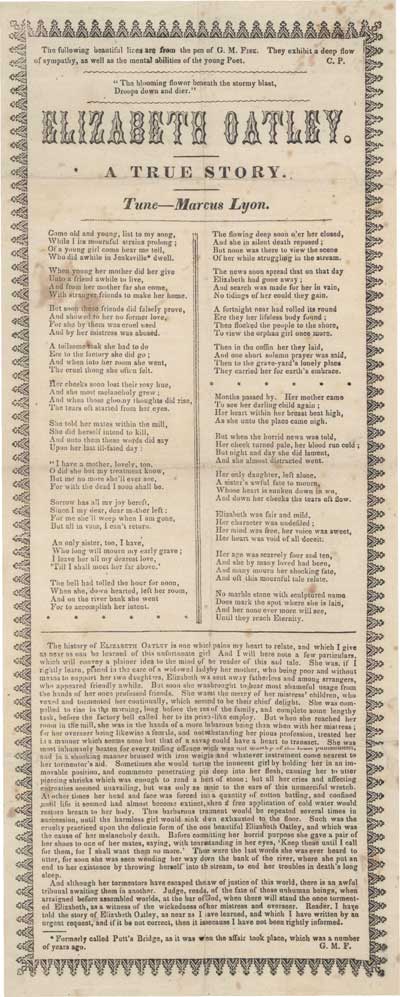The Tragedy of Elizabeth Oatley
By: Megan B., Nicholas C., and Lisa Marie O.
What was life like in the mid-1800’s in Jenksville, Ludlow?
Is a piece of historical literature a trustworthy source for depicting life in
the past?
Together, we analyzed a “broadside,” an article or pamphlet usually seen in popular places, which was possibly published in Palmer, Massachusetts in 1845. Broadsides covered informational sheets about wanted criminals, official government proclamations, special edition newspapers, revolutionary propaganda, parodies, poetry, and songs.
This
broadside featured a poem to the tune of “Marcus Lyon” by G.M. Fisk. The
poem told the tale of Elizabeth Oatley, a fourteen-year-old girl who worked in
the mills in the Jenksville section of Ludlow. It narrated how she was
sent to live with a friend of her mother’s, who made her get up before
everyone else and work until the bell tolled for her to go to the factory. In
the mills, she was bruised by iron weights, held down and stuck with pins, and
suffocated in cotton until she was nearly dead by the mill overseer. Elizabeth
finally finished the abuse by jumping into a river, presumably the Chicopee because
it is next to the Ludlow Mills. Her mother came to Ludlow to see her daughter,
only to find that she had died. In her grief, she, too, passed away.
Also on the broadside was a more detailed telling of Elizabeth’s life. It can also be supposed that many poor people sent their daughters to work in the mill, and that life in the mills must have been hostile and hard. However, it is important to note that while the broadside is a primary source, it may not have been entirely honest. G. M. Fisk could have added details that never took place, or fabricated the entire story for publicity. Even with this in mind, the tale of Elizabeth Oatley is one that pulls on the heartstrings.
